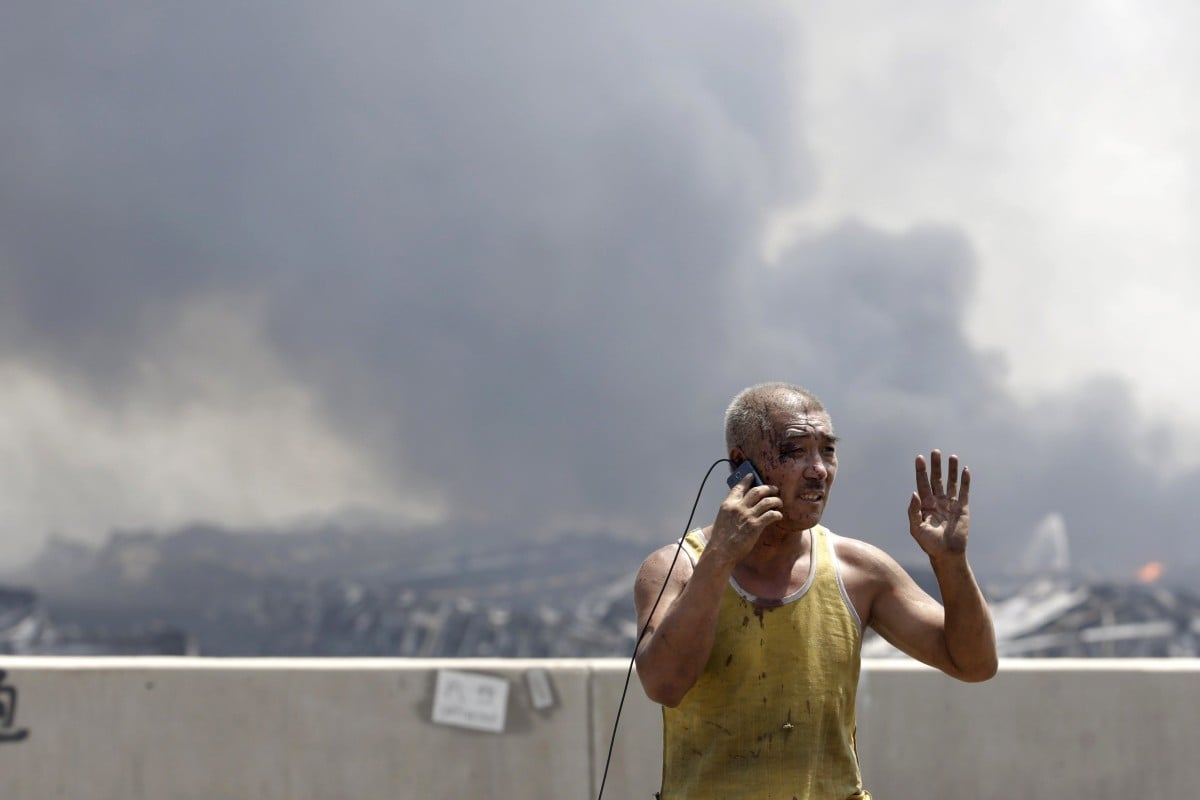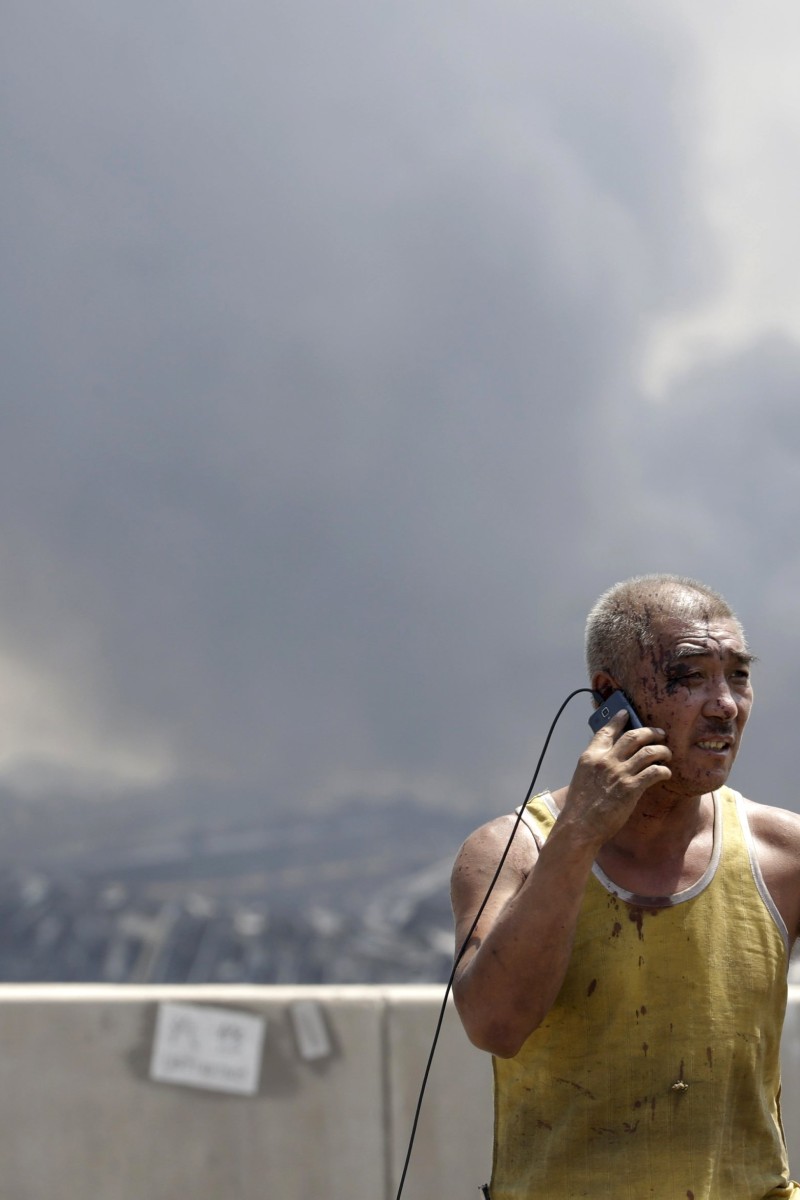 An injured man talks on his mobile phone at the site of the explosions at the Binhai new district in Tianjin.
An injured man talks on his mobile phone at the site of the explosions at the Binhai new district in Tianjin.An enormous explosions in the major Chinese port city of Tianjin killed at least 44 people and injured more than 500, state media reported today. The disaster left a devastated industrial landscape of incinerated cars, toppled shipping containers and burnt-out buildings.
An AFP reporter in Tianjin saw shattered glass up to three kilometres from the blast site, after a shipment of explosives detonated in a warehouse, unleashing a fireball that lit up the night sky and rained debris on the city.
The explosion was felt several kilometres away, even being picked up by a Japanese weather satellite. Images showed walls of flame enveloping buildings and rank after rank of gutted cars.
"When I felt the explosion I thought it was an earthquake," resident Zhang Zhaobo said. "I ran to my father and I saw the sky was already red. All the glass was broken, and I was really afraid."
Images showed residents, some partially clothed, running for shelter on a street strewn with debris.
"The fireball was huge, maybe as much as 100 metres tall," said 27-year-old Huang Shiting, who lives close to the site.
"I heard the first explosion and everyone went outside, then there was a series of more explosions, windows shattered and a lot of people who were inside were hurt and came running out, bleeding,” he said.
Paramedics rushed the wounded to the city's hospitals where doctors bandaged up victims, many of them covered in blood.
Citing rescue headquarters, China's Xinhua news agency said 44 people had been killed, including 12 firefighters.
Scores of firefighters were already on the scene before the explosion, responding to a fire.
At one city hospital a doctor wept over the remains of a firefighter still in uniform, his skin blackened from smoke, as he was wheeled along with two other bodies.
Xinhua said 520 people had been admitted to hospital, 66 of them in critical condition.
Mei Xiaoya, 10, and her mother were turned away from the first hospital they went to because there were too many people, she said.
"I'm not afraid, it's just a scratch," she said pointing to the bandage on her arm. "But mum was hurt badly, she couldn't open her eyes."
Plumes of smoke
Plumes of smoke still billowed over buildings hours after the blast, which occurred shortly before midnight local time.
"Of course I was afraid, how can you not be afraid?" said a man as he looked at his block of flats behind a police cordon. "I ran, I grabbed my child and my wife and ran."
Government newspaper the People’s Daily said in a social media post that there were people trapped by the fire, but CCTV said efforts to put out the blaze had been suspended as it was not clear whether dangerous items remained in the storage facility.
Specialist anti-chemical warfare troops were being sent to the site, the broadcaster added. It was not clear what caused the shipment of explosives to explode inside a storage container.
Executives from the company that owns the warehouses, Tianjin Dongjiang Port Rui Hai International Logistics, were taken into custody by police, Xinhua said.
3 tonnes of TNT
The force of the first explosion was the equivalent of three tonnes of TNT, the China Earthquake Networks Centre said on its verified Weibo account, followed by a second blast equal to 21 tonnes.
Worker dormitories in Tianjin's port area were reduced to twisted wreckage and injured migrants packed emergency rooms yesterday, as the poorer people of China’s economic boom got the worst of the disaster.
As dawn broke to reveal the extent of the devastation, many of the developments close to the blast site - near-complete luxury apartments and office buildings in the up-and-coming Binhai New District - appeared unharmed, except for shattered windows and the odd object crashing into a facade.
But alongside the pristine new buildings that show China’s rise sat twisted metal, torn off roofs and burned out huts - remnants of the flimsy metal structures that house workers, and looked instead like crumpled, discarded sweet wrappers.
Brightly coloured bedding was exposed to the morning sun, some stained with splatters of blood.
"I felt the hot wind on my face"
Construction worker Wang He lived in one of the dormitories, less than a kilometre from the blast, and awoke with a jolt, hitting his head on the ceiling.
"I saw a huge fireball, felt a hot wind on my face and then heard one of the loudest sounds in my life,” the 26-year-old said. "After I got over the shock, our workers' dormitory looked as if a giant had punched the side of the building."
Wang and about a dozen of his coworkers were waiting in Gangkou Hospital’s emergency room, where migrant workers were the only patients still being treated.
He is from the poor central province of Henan, and one of the hundreds of millions of low-paid, hard-working labourers who have poured into mainland cities from the countryside over the past two decades.
They have powered the boom that has made the country the world’s second-largest economy, but not always equally shared in its benefits.
At the city’s TEDA hospital, close to the blast site, security guard Zhang Hongjie, 50, sat with his head wrapped in bandages, his arms peppered with small cuts from flying glass.
"The explosion was terrifying, and I almost passed out,” he said. "I’m sorry, I still can’t think straight, I’m a bit confused," he said, adding he was homeless after his dormitory was destroyed.
Broken glass from shattered windows littered the ground as far away as three kilometres from the blast site.
A guard stood outside a bank branch whose entrance was completely destroyed, water from burst pipes slowly flooding the floor.
State broadcaster CCTV said in a Twitter post that Chinese President Xi Jinping had urged "all-out efforts to rescue victims and extinguish the fire"
Bad safety record
China has a very bad industrial safety record as some factory and warehouse owners disobey regulations to save money and pay off corrupt officials to not punish them.
In 2013, a pipeline explosion at state-owned oil refiner Sinopec’s facility in the eastern port of Qingdao killed 62 people and injured 136.
In July this year, 15 people were killed and more than a dozen injured when an illegal fireworks warehouse exploded in the northern province of Hebei, which neighbours Tianjin.
And at least 71 were killed in an explosion at a car parts factory in Kunshan, near Shanghai, in August last year.
More on Tianjin
Tianjin, about 140km southeast of Beijing, is one of China’s biggest cities, with a population of nearly 15 million people according to 2013 figures.
A manufacturing centre and major port for northern China, it is closely linked to Beijing, with a high-speed train line cutting the travel time between them to only 30 minutes.
Like Shanghai, several countries were granted trading "concessions" there during the 19th and early 20th centuries - settlements that were administered by a foreign power - starting with Britain and France in 1860.
Tianjin’s city centre retains a legacy of historic colonial architecture, along with more recent skyscrapers.
